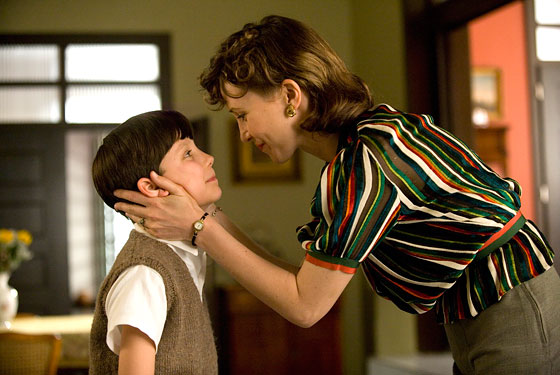
Years of hefty television roles and playing ruinous indie heroines has established Vera Farmiga as a formidable actress, with more than a dozen films in the last four years, including celebrated turns in Running Scared and the Oscar-winning The Departed. This fall, she’s back in two high-profile dramas, Mark Herman’s The Boy in the Striped Pajamas, and writer-director Rod Lurie’s Nothing But the Truth. In the former, she’s a German wife and mother who unravels as she discovers her husband’s complicity in prosecuting Adolf Hitler’s Final Solution; in the latter, she’s a tough, undercover CIA agent who gets outed in the press. Almost seven months pregnant, and in great spirits, Farmiga spoke with Vulture recently about her upcoming roles, her love affair with Upstate New York, and the little indie film that jump-started it all.
Prior to filming The Boy in the Striped Pajamas, were you familiar with the novel?
No, I wasn’t. And I don’t think I’d ever cried so hard the way I did when reading the script. I immediately ordered the book and then read the script again to make sure that it did the novel justice. And there was just an overwhelming sense of wanting to be a part of the movie.
One of the interesting undercurrents of the film is the willful obliviousness of your character. Obviously she responds very strongly, and we see a deterioration in her stability once things come to light, but do you think it’s a case of her not wanting to know what her husband is doing?
I think it is a “don’t ask, don’t tell” policy. Yes, the ideology of the times was radically different, and a women’s world was different — a German woman’s highest essence and purpose in life was to be a dutiful wife and a loving mother and be beautiful. That’s what was expected of women, that propaganda was instilled in them. I find it very difficult to understand that a woman, being the intuitive creatures that we are, would not intuit to some degree that people were being horribly mistreated, and not to question it. In my research, I found that the wives at Auschwitz, Treblinka, and Sobibór were lied to by their husbands, who were under strict oaths to keep the extermination programs top secret. The way that they found out was not until two years after they had lived there, and smelled the smells they smelled, and saw the ash in the air. But Rudolf Hirsch, in his memoirs, talks about the fact that the torturous screams of the prisoners would disturb his naps, so I don’t see how the women — with all these clues — couldn’t question it. It’s a willful refusal to see what’s going on.
You share many scenes with Asa Butterfield, who plays your son Bruno, and of course there is the old saying to beware children and animals in movies. Working with a young actor, are there certain things you do to help them get comfortable?
Asa didn’t have much of an acting background. This was his first profound experience on the set, which is always a circus anyway. He was just very much like his character; he walks through life with these big eyes. He’s such a bright, sharp kid, so intuitive. He had a great sense of awareness and depth, and not much had to be explained to him, so there wasn’t much trickery in the relationship.
The 2005 Down to the Bone barely received a domestic theatrical release, but do you believe your lead performance helped jump-start your career?
It did, and I have Debra Granik to thank for that. Debra and I are about to embark on our next collaboration — it’s called Miles from Nowhere, and it’s about a woman who’s kidnapped and ends up falling in love with her kidnapper. She’s taken away from a rather boring existence and embarks on an Alice in Wonderland–like journey. But it was our work, and being honored for it, which was really the biggest jump-start of my career. People always say that it was The Departed, but it was Marty [Scorsese] actually seeing my work in Down to the Bone.
You also have a key role in Nothing But the Truth, as outed CIA operative Erica Van Doren. Do you rock a blonde Valerie Plame wig?
[Laughs] No, on the contrary, I wanted to separate my character from her. But her media moment was upon me, actually, in the two weeks or so I was filming in Tennessee. I would come home and she was on every news venue — on Larry King or Meet the Press. So of course the character was inspired by that, and I had that to draw on, but she’s not the first operative to be exposed.
You live in Upstate New York — why not New York City or Los Angeles ?
Living upstate is nothing but beneficial for me. I’ve been working so much that, any time that’s not spent on set, I really need a place where I can completely decompress and be around the real-life people that I’m trying to portray in my work. And the little niche that I’ve carved out for myself upstate is a great vantage point, away from Hollywood and away from my career. I can take a step back and look at what’s important to me and what do I want to do next.

